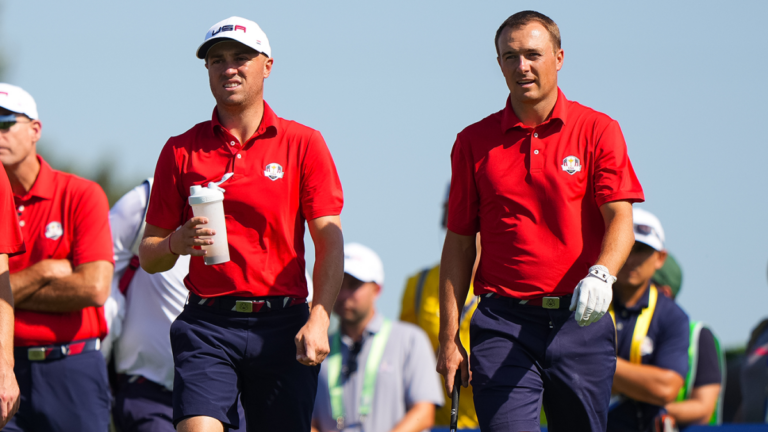Time flies when you’re playing Ryder Cups. One Cup, you’re an early 20s future superstar. The next, you’re dishing out advice to somebody who was playing college golf five months ago.
Rickie Fowler (34), Rory McIlroy (34), Jordan Spieth (30) and Justin Thomas (30) all qualify. Fowler and McIlroy are — are you ready for this? — two of the five oldest golfers in this entire event.
How is that possible?
Well, it’s how time works, of course, but it doesn’t make it any less difficult to understand or accept. If Fowler and McIlroy are considered old by this event’s standard, what does that mean for the rest of us?
It seems like just a few years ago that McIlroy was declaring the Ryder Cup just an exhibition. He went 1-1-2 in his first Ryder Cup (2010) after eschewing it as not something he would ever care about like he would the major championships.
That turned out to be a comically incorrect declaration, and McIlroy would go on to play every Ryder Cup session for Europe from then until the second day of the 2021 Ryder Cup at Whistling Straits. His 12-12-4 record is good — not great — but he has had some real moments in an event full of them.
That 2010 Ryder Cup was Fowler’s first, too. It was also the first of three consecutive road losses for U.S. teams on which he participated. His record of 3-7-5 leaves a bit more to be desired than that of McIlroy, though he is likely at a point in his career where his contribution to the U.S. team this year will happen as much off the course in the team room as it will on the course on Friday, Saturday and Sunday.
It seems like just a few years ago that Spieth was fist-pumping putts next to Patrick Reed in Scotland. All of a sudden, he has transformed from a young pup to an old war horse who has seen a wide variety of circumstances take place at this biennial competition. His 8-7-3 record is weighed down by no singles wins in four tries. He, too, has not won a Ryder Cup in Europe.
What all of these guys have in common is experience. On the U.S. side, nobody has won more points than Spieth and Thomas (6-2-1). Experience, though, can sometimes be detrimental to the way one plays in an event. Innocence often seems to be a superpower at Ryder Cups where you don’t know what it feels like to fail because you never even consider it. ‘
However, some of this experience could benefit their respective teams.
McIlroy, for example, could team with Ludvig Aberg, who played in the Big 12 Championship this year for Texas Tech. There’s no great on ramp at your first Ryder Cup as a 22-year-old, but playing alongside one of the 25 best golfers in history is as good as they get for a rookie like Aberg, who could play the role Thomas Pieters played in 2016 when he went 4-1-0 as a 24-year-old first-timer.
And while Spieth, like McIlroy, has an on-course role to play, he’s also played far more matches than anyone else on the American side. He said Tuesday that he and his teammates are not thinking about the 30-year drought that has been repeated ad nauseam; rather, he and Fowler plan to carry with them the fire that comes with being shut out in Europe twice and three times, respectively.
“I mean, probably Rickie feels that way. Guys who have played one and lost one over here probably feel [that there won’t be a sea change until the U.S. wins one in Europe],” said Spieth. “But it has nothing to do with 30 years of it. It’s just a couple of them for me and one of them for some others.”
It’s a good balance for the U.S. team. They have players who have lost enough to be angry about it but not enough for it to have become a ritual.
Thomas was on the 2018 Paris team that got housed by a supposedly inferior European team. His inclusion on this team as a captain’s pick — despite poor form throughout the year — had something to do with his sterling Ryder Cup record, sure, but I suspect it had just as much to do with what he brings to the team off the course.
“Like I’ve told [captain Zach Johnson] and I’ve told other captains, my role on the team is whatever it needs to be,” said Thomas on Tuesday. “I’m happy to help rookies. I’m happy to talk to certain people. You need me four [matches], you need me five, you need me one? Whatever is best for this team is the only thing that matters.”
There are golfers in this event who are older than these four players. But there aren’t many (if any) that are both older and more respected than this early to mid-30s group. You could throw Brooks Koepka and his five major championships in there as well, but it’s not as easy to envision him as a young phenom ready to take over the world because his development came a bit later than all four of these players.
While it’s a bit strange to think of McIlroy and Spieth as veterans (!), that doesn’t mean it’s an inaccurate description of them. As good as this collective group has been on the course, it’s not difficult to envision that, over the next few Ryder Cups, they will develop into leadership roles that are just as meaningful and perhaps as impactful as their playing careers in team events have been thus far.

